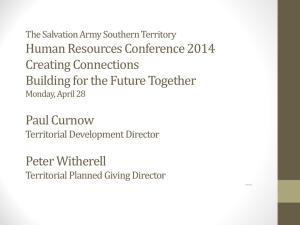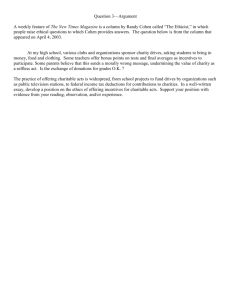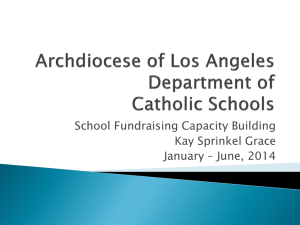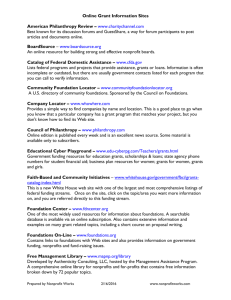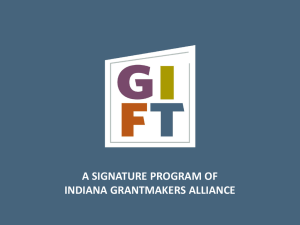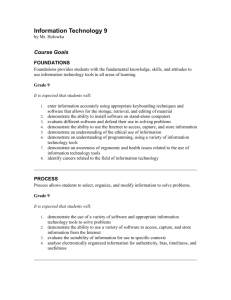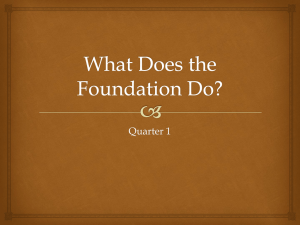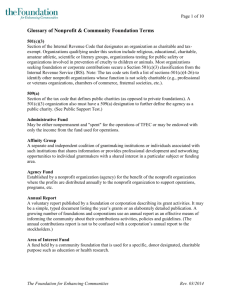Philanthropic Glossary: Terms to Know
advertisement
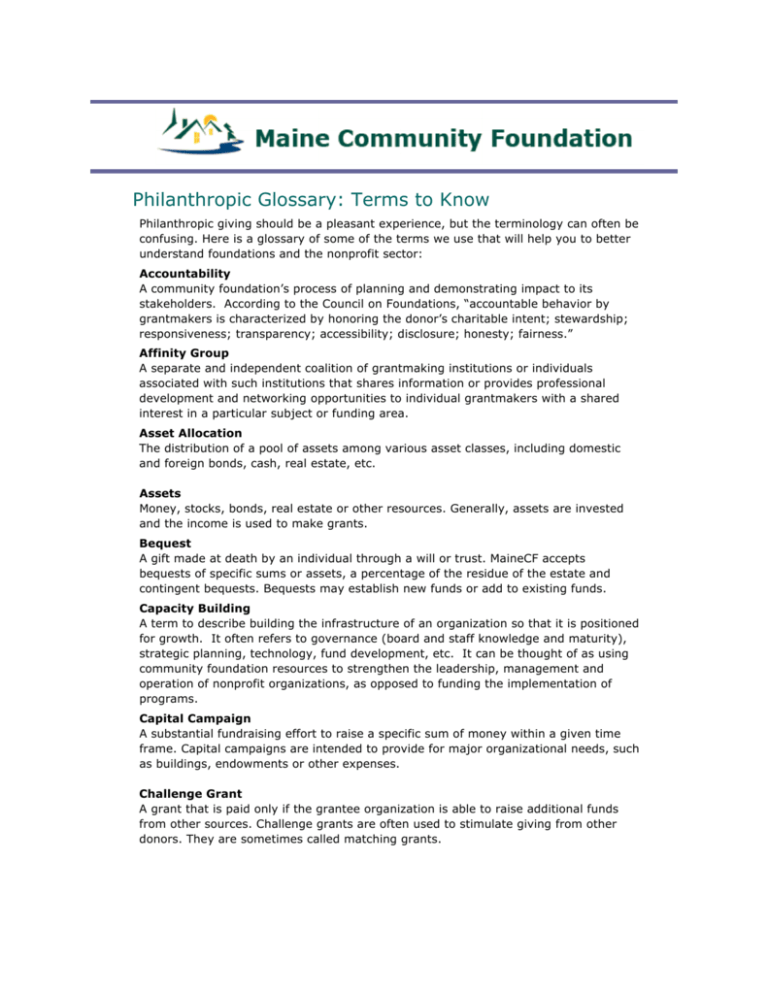
Philanthropic Glossary: Terms to Know Philanthropic giving should be a pleasant experience, but the terminology can often be confusing. Here is a glossary of some of the terms we use that will help you to better understand foundations and the nonprofit sector: Accountability A community foundation’s process of planning and demonstrating impact to its stakeholders. According to the Council on Foundations, “accountable behavior by grantmakers is characterized by honoring the donor’s charitable intent; stewardship; responsiveness; transparency; accessibility; disclosure; honesty; fairness.” Affinity Group A separate and independent coalition of grantmaking institutions or individuals associated with such institutions that shares information or provides professional development and networking opportunities to individual grantmakers with a shared interest in a particular subject or funding area. Asset Allocation The distribution of a pool of assets among various asset classes, including domestic and foreign bonds, cash, real estate, etc. Assets Money, stocks, bonds, real estate or other resources. Generally, assets are invested and the income is used to make grants. Bequest A gift made at death by an individual through a will or trust. MaineCF accepts bequests of specific sums or assets, a percentage of the residue of the estate and contingent bequests. Bequests may establish new funds or add to existing funds. Capacity Building A term to describe building the infrastructure of an organization so that it is positioned for growth. It often refers to governance (board and staff knowledge and maturity), strategic planning, technology, fund development, etc. It can be thought of as using community foundation resources to strengthen the leadership, management and operation of nonprofit organizations, as opposed to funding the implementation of programs. Capital Campaign A substantial fundraising effort to raise a specific sum of money within a given time frame. Capital campaigns are intended to provide for major organizational needs, such as buildings, endowments or other expenses. Challenge Grant A grant that is paid only if the grantee organization is able to raise additional funds from other sources. Challenge grants are often used to stimulate giving from other donors. They are sometimes called matching grants. Charitable Gift Annuity An arrangement in which someone transfers cash or other assets to a charitable organization in exchange for its promise to pay that person an annuity for life or for a term of years. Charitable Lead Trust A trust that provides income to a charity such as MaineCF for a specified period of time. At the end of that period, trust assets are distributed to non-charitable beneficiaries such as the donor’s children or grandchildren. The donor is able to make gifts of assets to his/her heirs at favorable gift tax rates and remove assets from his/her estate while benefiting a favorite charity. Charitable Remainder Trust This trust provides income to non-charitable beneficiaries for a period of time. These beneficiaries can include the donor, his/her spouse, children, or any non-relative. At the end of that period, the trust assets are distributed to a charity such as the Maine Community Foundation. The donor receives an immediate tax deduction, removes assets from his/her estate (thus eliminating estate taxes on those assets) and often increases the income produced by those assets while ultimately benefiting a favorite charity. Community catalyst A community foundation using the various tools at its disposal—in addition to grantmaking—to help local residents make positive change happen on important needs or issues. Catalyst roles include: l Coalition builder: helping organize and support the formation of groups that would address community issues l Community organizer: mobilizing, informing and supporting local efforts to address community issues l Convenor: bringing together various community groups in order to foster learning and sharing or to mobilize work on community issues l Intermediary: serving as a fiscal agent, program manager or information source for government and private funders of community programs l Knowledge broker: providing knowledge of community needs, projects, organizations and funding opportunities to donors and other public and private funders Community Foundation A tax-exempt, nonprofit, autonomous, publicly supported, philanthropic institution composed primarily of permanent funds established by many separate donors for the long-term diverse, charitable benefit of the residents of a defined geographic area. Typically, a community foundation serves an area no larger than a state. Community foundations provide an array of services to donors who wish to establish funds without incurring the administrative and legal costs of starting independent foundations. Component Fund An individual fund that is a part of a community foundation’s family of funds. Corporate Foundation A foundation that receives its income from a profit-making company but is a legally independent entity. Usually this type of foundation carries the name of the parent company. Council on Foundations The international membership association (www.cof.org) that serves the public good by promoting knowledge and growth and enhancing responsible and effective philanthropy. Its nearly 2,000 members consist of community foundations, corporate foundations and giving programs, private and family foundations, public foundations, and a new category known as emerging foundations. Designated Funds Funds that benefit one or more specific charitable organizations named by the donor. Designated funds often are endowed in perpetuity, with the income used to support the organizations on an ongoing basis. MaineCF ensures that disbursements are made to appropriate charitable agencies as specified in the establishing fund document. If an agency stops functioning as an exempt charity or ceases to exist, the foundation board may select an alternative charity as indicated in the fund document. Discretionary Funds Funds that allow a community foundation to determine where grants will do the most good. Also called unrestricted funds, these funds offer MaineCF maximum flexibility to respond to changing needs in the community. Distribution committee: The committee responsible for making grant decisions. For community foundations, the distribution committee is intended to be broadly representative of the community served by the foundation. Donor-Advised Fund A fund held by a community foundation where the donor, or a committee appointed by the donor, may recommend eligible charitable recipients for grants from the fund. The community foundation’s governing body must be free to accept or reject the recommendations. This flexible tool for charitable giving operates much like a personal or family foundation. Donors can contribute to their fund when it is most convenient and then recommend gifts over time to nonprofit organizations of their choice. The donor selects a fund name and investment strategy and then makes grants to organizations committed to the causes he or she cares about. Donors sometimes involve their children and grandchildren to share in a family tradition of giving. Due Diligence In grantmaking, this speaks to the practices one applies to reviewing grant requests prior to approving them. It generally includes establishing the charitable status of the grantee, the charitable purpose of the grant, and the financial and organizational capacity of the organization to undertake the proposed activities. Eleemosynary Of or pertaining to alms, charity or charitable donations; dependent on or supported by charity. Endowment Funds intended to be invested in perpetuity to provide income for continued support of a not-for-profit organization. Fiscal sponsorship Affiliation with an existing nonprofit organization for the purpose of receiving grants. Grant seekers may either apply for federal tax-exempt status or affiliate with a nonprofit sponsor. Family Foundation A private foundation created to make charitable contributions on behalf of a particular family. The board is often limited to family members. Field-of-Interest Funds Funds that support an area of charitable interest, defined broadly (such as education) or narrowly (such as advanced vocal music training). Donors also can select a defined geographic area or specific community to benefit from their named fund. 501(c)(3) The section of the tax code that defines nonprofit, tax-exempt charitable (as broadly defined) organizations. 501(c)(4) Organizations that are community or fraternal organizations that are not solely charitable. Form 990/Form 990-PF: The IRS forms filed annually by public charities and private foundations, respectively (the letters PF stand for private foundation). The IRS uses these forms to assess compliance with the Internal Revenue Code. Fund An entity established for the purpose of accounting for resources used for specific activities or objectives in accordance with special regulations, restrictions, or limitations. Community foundation assets are held in many named component funds established by donors or the foundation for specific or unrestricted purposes. Fund Agreement A contract between MaineCF and the donor stipulating the purposes for which the fund will be used. Gift Term used to describe an asset contributed by a donor to a fund at the community foundation. This could be cash, appreciated stock, real estate, etc. MaineCF uses “gift” to describe assets contributed to a fund, and “grant” to describe a donation to an organization (“gift in, grant out”). Gift, Historical Value The monetary value of a charitable gift at the time it is given. Gift, Real Value The monetary value of a charitable gift after adjustment for inflation and appreciation since the gift was completed. Grant An amount of money given to an organization or person in order to perform charitable activities. Grantee The recipient of a grant. (Also known as the grant recipient or beneficiary.) Indicator A measure of success. Indicators are identified as part of the design process for grants and community catalyst efforts; they are then evaluated as part of the measurement process for grants and community catalyst efforts. In-kind Contribution Support in the form of goods or services rather than a cash contribution. Investment Manager An individual, firm or committee responsible for making day-to-day decisions to buy, hold or sell assets. Also known as money managers or investment advisors. Meliorism The doctrine that the world tends to become better, or may be made better by human effort. National Standards for U.S. Community Foundations The National Standards are the minimum requirements for the governance, structure and activities of community foundations. MaineCF adopted the standards in 2004. Nonprofit (Not-for-profit) A term describing the Internal Revenue Service’s designation of an organization whose income is not used for the benefit or private gain of stockholders, directors, or any other persons with an interest in the company. A nonprofit organization’s income must be used solely to support its operations and stated purpose. Nonprofit/Agency Endowment Fund A component endowment fund established by a nonprofit organization to provide support for that organization. Operating Support A grant made to further the general purpose or work of an organization, rather than for a specific project or purpose. Philanthropy 1. Voluntary action for the public good. 2. Love of humankind, usually expressed by an effort to enhance the well-being of humanity through personal acts of practical kindness or by financial support of a cause or causes 3. Any effort to relieve human misery or suffering, improve the quality of life, encourage aid or assistance, or foster preservation of values through gifts, service, or other voluntary activity. Principal The dollar value of an asset. When used in relation to an endowment, it means the sum of the dollar values of all gifts to the endowment using the dollar value of each gift on the day the gift was completed. Program officer: A staff member of a foundation who reviews grant proposals and processes applications. Public Charity A nonprofit organization that qualifies for tax-exempt status under section 501(c)(3) of the IRS code. Public charities are the recipients of most foundation and corporate grants. Some public charities also make grants. Public charities are eligible for maximum income tax-deductible contributions from the public and are not subject to the same rules and restrictions as private foundations. Regional Associations of Grantmakers (RAGs) Nonprofit membership associations of foundations and related organizations that share a common goal: to strengthen philanthropy in a distinct geographic region, e.g., a city, state, or multi-state area. RAG members include private or independent foundations, community foundations and corporate foundations and giving programs. In addition, some RAGs include in their membership related organizations, such as financial advisor firms or nonprofit grantseeking groups. Seed Money A grant or contribution used to start a new project or organization. Site Visit The donor or grantor’s visit to the physical location of a grantee to meet with the staff, and/or directors. Spending Rule Formula for grantmaking based on a designated percentage of an endowment fund’s fair market value. MaineCF’s current spending policy is 5% of the fund’s value over 12 quarters. It is intended to allow grants to be made from the fund in perpetuity. Trust A legal device used to set aside assets of one individual for the benefit of one or more persons or organizations. Tax-exempt Refers to organizations that do not have to pay taxes. Individuals who make donations to such organizations may be able to deduct these contributions from their income tax. Technical assistance Operational or management assistance given to nonprofit organizations. This can include fundraising assistance, budgeting and financial planning, program planning, marketing and other aids to management. Assistance may be offered directly by the staff of a foundation, or it may be provided in the form of a grant to pay for the services of an outside consultant. Unrestricted Fund For a community foundation, an unrestricted fund is one that is not specifically designated to specific uses by the donor, or for which restrictions have expired or been removed. Confirmed in compliance with national standards for U.S. community foundations Ellsworth Office | 245 Main Street Ellsworth, ME 04605 | (207) 667-9735 | (207) 667-0447 (fax) | 1-877-700-6800 Portland Office | 1 Monument Way, Suite 200 Portland, ME 04101 | (207) 761-2440 | (207) 773-8832 (fax) Copyright Maine Community Foundation 2006
